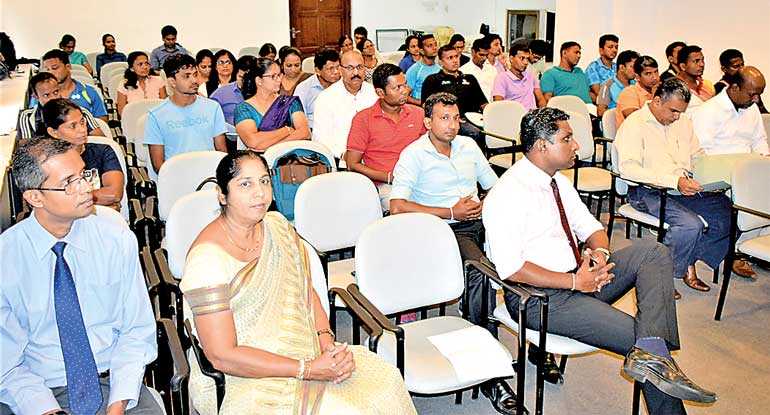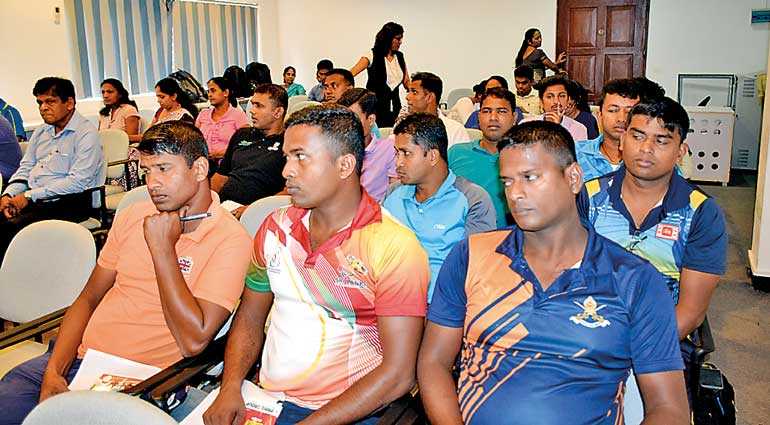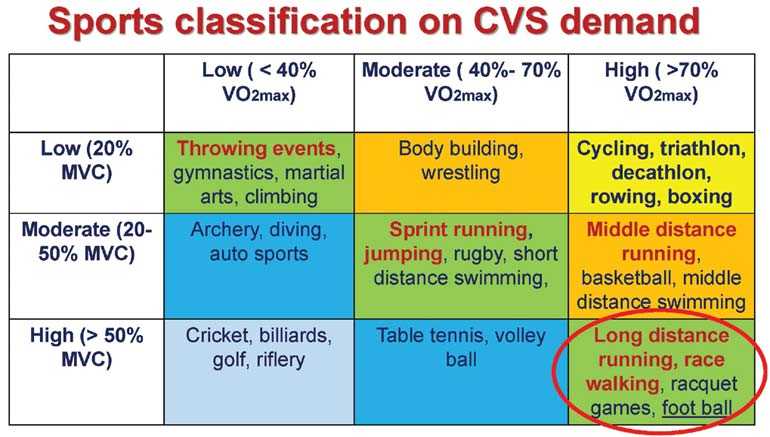Tuesday Mar 18, 2025
Tuesday Mar 18, 2025
Thursday, 31 January 2019 00:14 - - {{hitsCtrl.values.hits}}


The National Science Foundation (NSF) conducted a highly insightful knowledge sharing session for local sports administrators, trainers and ground-level practitioners, sharing eye-opening results of a three-year research on the exercise physiology of Sri Lankan athletes.
|
Dr. Upendra Wijayasiri |
The results indicate that Sri Lanka’s national level athletes and their custodians lack proper guidance and direction in how to apply science research findings and technology to improve athletic performances, and is expected to be the start of a steady revolution of physically progressing athletes displaying the right combination of strength, agility and stamina for the corresponding sporting discipline they undertake.
The knowledge sharing session organised by the NSF together with some of Sri Lanka’s leading medical experts was held with the objective of creating a collaborative network between sports administrators and medical experts in the country. This in turn would emphasise the importance of exercise physiology, analyse the current status of our national athletes and most crucially, apply these new research findings for the ultimate betterment of sports and athletes in Sri Lanka.
The research was conducted by Dr. Upendra Wijayasiri, Head – Sports and Exercise Medicine Unit, Colombo South Teaching Hospital, Kalubowila from 2015-2017 with the overarching objective of determining cardiopulmonary (heart and lung) fitness among national level athletes engaged in running events. This is the first research study of its kind conducted on cardiopulmonary fitness of Sri Lankan athletes practicing multiple running disciplines. The study analysed top 100 national level athletes, top 100 university level athletes and a control group of university students not engaged in regular sporting activities for comparison purposes.
The results and conclusion of the study showed that Sri Lanka’s national level athletes required immediate attention and guidance in improving performance through the proper application of exercise physiology in areas such as peak oxygen consumption, enhancing endurance and the overall ‘remodelling’ of the cardiovascular system through appropriate and continuous training.
Distinctive running events spread across sprints, middle-distance running and long-distance running require different levels of cardiopulmonary fitness, and at present is an area that is greatly lacking research, investment, awareness and knowledge in Sri Lanka. Through this research and knowledge sharing session conducted by the NSF and the dedicated medical practitioners of the Faculty of Medical Sciences at the University of Sri Jayewardenepura, Sri Lankan sports administrators were given a foundation and proper direction on how to improve athletic performance of our national level athletes.
Esteemed medical experts Dr. Himansu Waidyasekara, Senior Lecturer – Faculty of Medical Sciences, University of Sri Jayewardenepura and Prof. Savithri W. Wimalasekara, Consultant Clinical Physiologist – Department of Physiology, Faculty of Medical Sciences, University of Sri Jayewardenepura joined Dr. Upendra Wijayasiri for the knowledge sharing session.
It was discussed during the session how best to alter training protocols of Sri Lankan runners so that they are fine-tuned with their associated distances to improve fitness and competitiveness. The physiological remodelling or improvement of athletes will be based on individual analysis and customised training routines, where the medical panel extended a free and open invitation to all national sports administrators and athletes to benefit from services being offered by the pioneering Exercise Physiology Laboratory at the Faculty of Medical Sciences, University of Sri Jayewardenepura (FMS/USJP).
The services offered at the Exercise Physiology Laboratory at the FMS/USJP include expert advice, medical and physiological data, exercise and training modifications, medical and nutritional intervention, periodical analysis of athletes and research on performance improvements. “This program is an outcome of a special training received by Dr. Upendra Wijayasiri under the Overseas Special Training (OSTP) grants scheme of NSF,” commented Dr. Thamara F. Dias, Additional Director of the National Science Foundation. “As the chief advocate of science, technology and innovation in Sri Lanka, it is our mandate to allow science to pave way for a promising future. This merging of science and sports in Sri Lanka is still in its’ infantile stage, but with the proper guidance and nurturing, we can ensure a sound future to our talented national athletes.”
“Exercise physiology/cardiopulmonary fitness assessment and the technologies therein on a global scale have advanced greatly over the past few decades,” expressed Dr. Upendra Wijayasiri. “Unfortunately, Sri Lanka’s utilisation of exercise physiology has not kept up with this global pace. Our nation has lagged far behind in this area, ever since its introduction as a field of study in Sri Lanka in 2012 due to untiring efforts made by the Department of Physiology at the FMS/USJP. With the commitment of medical practitioners under the guidance of national establishments such as the NSF, great leaps have been made, and will continue with this momentum and soon reap the benefits.”

Discover Kapruka, the leading online shopping platform in Sri Lanka, where you can conveniently send Gifts and Flowers to your loved ones for any event including Valentine ’s Day. Explore a wide range of popular Shopping Categories on Kapruka, including Toys, Groceries, Electronics, Birthday Cakes, Fruits, Chocolates, Flower Bouquets, Clothing, Watches, Lingerie, Gift Sets and Jewellery. Also if you’re interested in selling with Kapruka, Partner Central by Kapruka is the best solution to start with. Moreover, through Kapruka Global Shop, you can also enjoy the convenience of purchasing products from renowned platforms like Amazon and eBay and have them delivered to Sri Lanka.
Discover Kapruka, the leading online shopping platform in Sri Lanka, where you can conveniently send Gifts and Flowers to your loved ones for any event including Valentine ’s Day. Explore a wide range of popular Shopping Categories on Kapruka, including Toys, Groceries, Electronics, Birthday Cakes, Fruits, Chocolates, Flower Bouquets, Clothing, Watches, Lingerie, Gift Sets and Jewellery. Also if you’re interested in selling with Kapruka, Partner Central by Kapruka is the best solution to start with. Moreover, through Kapruka Global Shop, you can also enjoy the convenience of purchasing products from renowned platforms like Amazon and eBay and have them delivered to Sri Lanka.